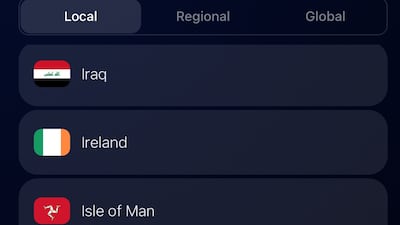A boom in travel and a slow but steady phase out of physical Sim card slots by smartphone makers like Apple have caused a surge in eSim adoption, analysts have said.
More than six billion eSim-capable devices are expected to be shipped by 2026, said Ankit Malhotra, a senior research analyst at Counterpoint, a global technology research firm.
"Nobody wants to lose customers," he said.
Traditionally, smartphones have relied on physical Sim (subscriber identity module) cards, often the size of a fingernail, to connect users with phone and data plans.
Although physical Sim cards have been prevalent for many years, they are also a source of frustration, especially among international travellers.
On arrival in a new country, it is still common for people to make their first trip to a store to buy a Sim card, and then carefully install it in their phones.
The cumbersome process, as against the innovative smartphone, is annoying to many.
Users can switch their phone providers quickly using eSim (embedded Sim) technology.
"Earlier operators were not that willing to adopt eSims because they thought it might churn their subscribers," said Mr Malhotra. The technology has been around since 2016, he added.
The convenience of eSim technology is moving the needle as carriers allow their networks to appear on eSim apps.
"They're coming around to it, especially with the iPhone clearly moving in that direction," Mr Malhotra said.
While iPhone models have supported eSim technology since 2018, the introduction of the iPhone 14 in 2022, the US version of which eliminated the physical Sim card slot, proved to be a turning point, he added.
While Sim cards and Sim card slots are still prevalent in smartphones, many in the premium category now support eSims.
Adoption of the technology also received a boost from so-called post-pandemic "revenge travel", Mr Malhotra said.
"That's the biggest use case," he said.
"If you want to go on a seven-country tour, you can use an eSim through a mobile virtual network operator (MVNO), and that will allow you to use your phone immediately in those seven countries."
MVNOs operate without a physical footprint, Mr Malhotra said.
"They run their entire operations online ... they create an app and they can serve millions of smartphone users worldwide," he added.

Riding the wave of the MVNO boom is Dina Tsybulskaya, chief executive and chief strategist for Lithuania-based eSim Plus, which describes itself as a mobile data and virtual Sim company with more than three million users.
"I switched from traditional telecom," said Ms Tsybulskaya, the former chief executive of Telekom Romania Mobile. "This is the future, it's going to be global ... and it's looking bright."
Ms Tsybulskaya anticipates that 80 per cent of smartphone users will have eSim-capable devices by 2027.
"You're going to have fully digital connectivity and you're going to have it at any point of the world," she said.
The adoption of eSim technology in the GCC, she said, is among the strongest in the world.
"This is one of our fastest growing markets among all regions," she said.
"The region has become really attractive for people who we would call digital nomads ... they're very technologically savvy, and they're travelling a lot.
"It's a perfect match."
Room for growth?
While there's definitely momentum for eSim technology, that momentum has been reserved mainly for the premium smartphone market.
"The market is still developing and saturation is still far away for now," said Mr Malhotra. "If you go for a budget or lower-than-budget smartphone, you don't see eSim coming to that range yet."
The technology has seen the widest adoption among higher-end iPhone and Samsung Galaxy users, he added.
Ms Tsybulskaya agreed that physical Sim cards still dominate on lower-end smartphones.
"If you remember not too long ago, that was the case with 5G," she said, referring to the penetration of the speedier wireless communication.
"It was a very premium thing."
Ms Tsybulskaya said she was confident that eSim technology would follow that pattern.
"It's going to become very normal, and cheaper," she said.
Importance in conflict zones
Amid wars in Gaza and Ukraine, eSims have also proven critical to ensuring that communication remains possible amid power outages, internet blackouts and data jamming.
Efforts to try and circumvent telecommunications blackouts have proven effective using eSim technology
Simly, a Dubai-based telecommunications company founded in 2022 with offices in Jeddah, Beirut, Baghdad and Erbil, offered free eSim accounts “to help families in Gaza reach out to each other”.
The company raised more than $70,000 in less than 24 hours to help restore internet connectivity in Gaza through eSims, it said in an October 28 Instagram post.
Through the company’s app, various eSim plans are available for purchase in Turkey, Spain, the UAE, Saudi Arabia, France, Palestine and in other countries.
“Hundreds of eSims have already been distributed and successfully connected civilians, journalists and doctors around the borders of Gaza,” the company said on Instagram.
The purchase and distribution of eSim plans, however, also depends on getting the information out to people affected by blackouts.
Despite this, Ms Tsybulskaya said that the ability to quickly switch phone and data plan providers in both Gaza and Ukraine illustrates the broader advantage of eSims.
"It can be an earthquake, flood or conflict, infrastructure is vulnerable to crisis," she said. "Through eSims we're able to immediately look at who still has coverage and what provider is still working ... you have an immediate opportunity to switch."


